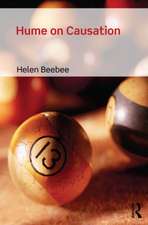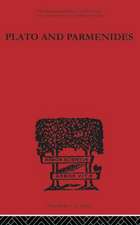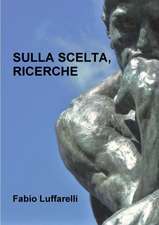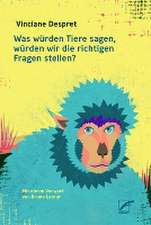What Would Animals Say If We Asked the Right Questions?: Posthumanities, cartea 38
Autor Vinciane Despret Traducere de Brett Buchananen Limba Engleză Paperback – 15 mai 2016
“You
are
about
to
enter
a
new
genre,
that
of
scientific
fables,
by
which
I
don’t
mean
science
fiction,
or
false
stories
about
science,
but,
on
the
contrary,
true
ways
of
understanding
how
difficult
it
is
to
figure
out
what
animals
are
up
to.”
—Bruno
Latour,
form
the
Foreword
Is it all right to urinate in front of animals? What does it mean when a monkey throws its feces at you? Do apes really know how to ape? Do animals form same-sex relations? Are they the new celebrities of the twenty-first century? This book poses twenty-six such questions that stretch our preconceived ideas about what animals do, what they think about, and what they want.
In a delightful abecedarium of twenty-six chapters, Vinciane Despret argues that behaviors we identify as separating humans from animals do not actually properly belong to humans. She does so by exploring incredible and often funny adventures about animals and their involvements with researchers, farmers, zookeepers, handlers, and other human beings. Do animals have a sense of humor? In reading these stories it is evident that they do seem to take perverse pleasure in creating scenarios that unsettle even the greatest of experts, who in turn devise newer and riskier hypotheses that invariably lead them to conclude that animals are not nearly as dumb as previously thought.
These deftly translated accounts oblige us, along the way, to engage in both ethology and philosophy. Combining serious scholarship with humor that will resonate with anyone, this book—with a foreword by noted French philosopher, anthropologist, and sociologist of science Bruno Latour—is a must not only for specialists but also for general readers, including dog owners, who will never look at their canine companions the same way again.
Is it all right to urinate in front of animals? What does it mean when a monkey throws its feces at you? Do apes really know how to ape? Do animals form same-sex relations? Are they the new celebrities of the twenty-first century? This book poses twenty-six such questions that stretch our preconceived ideas about what animals do, what they think about, and what they want.
In a delightful abecedarium of twenty-six chapters, Vinciane Despret argues that behaviors we identify as separating humans from animals do not actually properly belong to humans. She does so by exploring incredible and often funny adventures about animals and their involvements with researchers, farmers, zookeepers, handlers, and other human beings. Do animals have a sense of humor? In reading these stories it is evident that they do seem to take perverse pleasure in creating scenarios that unsettle even the greatest of experts, who in turn devise newer and riskier hypotheses that invariably lead them to conclude that animals are not nearly as dumb as previously thought.
These deftly translated accounts oblige us, along the way, to engage in both ethology and philosophy. Combining serious scholarship with humor that will resonate with anyone, this book—with a foreword by noted French philosopher, anthropologist, and sociologist of science Bruno Latour—is a must not only for specialists but also for general readers, including dog owners, who will never look at their canine companions the same way again.
Din seria Posthumanities
-
 Preț: 220.24 lei
Preț: 220.24 lei -
 Preț: 188.33 lei
Preț: 188.33 lei -
 Preț: 162.02 lei
Preț: 162.02 lei -
 Preț: 123.92 lei
Preț: 123.92 lei -
 Preț: 132.16 lei
Preț: 132.16 lei -
 Preț: 170.61 lei
Preț: 170.61 lei -
 Preț: 215.67 lei
Preț: 215.67 lei -
 Preț: 112.18 lei
Preț: 112.18 lei -
 Preț: 171.91 lei
Preț: 171.91 lei -
 Preț: 185.87 lei
Preț: 185.87 lei -
 Preț: 185.21 lei
Preț: 185.21 lei -
 Preț: 145.56 lei
Preț: 145.56 lei -
 Preț: 169.30 lei
Preț: 169.30 lei -
 Preț: 107.72 lei
Preț: 107.72 lei -
 Preț: 146.17 lei
Preț: 146.17 lei -
 Preț: 154.57 lei
Preț: 154.57 lei -
 Preț: 178.55 lei
Preț: 178.55 lei -
 Preț: 112.50 lei
Preț: 112.50 lei -
 Preț: 155.48 lei
Preț: 155.48 lei -
 Preț: 169.70 lei
Preț: 169.70 lei -
 Preț: 153.60 lei
Preț: 153.60 lei -
 Preț: 186.23 lei
Preț: 186.23 lei -
 Preț: 179.48 lei
Preț: 179.48 lei -
 Preț: 187.41 lei
Preț: 187.41 lei -
 Preț: 304.84 lei
Preț: 304.84 lei -
 Preț: 120.18 lei
Preț: 120.18 lei -
 Preț: 242.71 lei
Preț: 242.71 lei -
 Preț: 187.73 lei
Preț: 187.73 lei -
 Preț: 138.99 lei
Preț: 138.99 lei -
 Preț: 185.76 lei
Preț: 185.76 lei -
 Preț: 216.24 lei
Preț: 216.24 lei -
 Preț: 224.90 lei
Preț: 224.90 lei -
 Preț: 218.74 lei
Preț: 218.74 lei -
 Preț: 223.55 lei
Preț: 223.55 lei -
 Preț: 222.01 lei
Preț: 222.01 lei -
 Preț: 198.89 lei
Preț: 198.89 lei -
 Preț: 222.18 lei
Preț: 222.18 lei -
 Preț: 209.96 lei
Preț: 209.96 lei -
 Preț: 178.37 lei
Preț: 178.37 lei -
 Preț: 234.86 lei
Preț: 234.86 lei -
 Preț: 204.11 lei
Preț: 204.11 lei -
 Preț: 208.36 lei
Preț: 208.36 lei -
 Preț: 223.55 lei
Preț: 223.55 lei -
 Preț: 230.95 lei
Preț: 230.95 lei -
 Preț: 170.98 lei
Preț: 170.98 lei - 19%
 Preț: 99.50 lei
Preț: 99.50 lei
Preț: 214.29 lei
Nou
Puncte Express: 321
Preț estimativ în valută:
41.02€ • 44.57$ • 34.48£
41.02€ • 44.57$ • 34.48£
Carte disponibilă
Livrare economică 31 martie-14 aprilie
Livrare express 15-21 martie pentru 26.12 lei
Preluare comenzi: 021 569.72.76
Specificații
ISBN-13: 9780816692392
ISBN-10: 0816692394
Pagini: 288
Dimensiuni: 140 x 216 x 20 mm
Greutate: 0.37 kg
Ediția:1
Editura: University of Minnesota Press
Colecția Univ Of Minnesota Press
Seria Posthumanities
ISBN-10: 0816692394
Pagini: 288
Dimensiuni: 140 x 216 x 20 mm
Greutate: 0.37 kg
Ediția:1
Editura: University of Minnesota Press
Colecția Univ Of Minnesota Press
Seria Posthumanities
Notă biografică
Vinciane Despret is associate professor of philosophy at University of Liège and Free University of Brussels. Her eight books include Women Who Make a Fuss (with Isabelle Stengers) and Our Emotional Makeup.
Brett Buchanan is director of the School of the Environment and associate professor of philosophy and environmental studies at Laurentian University, Canada.
Bruno Latour is a french philosopher, anthropologist, and sociologist of science.
Brett Buchanan is director of the School of the Environment and associate professor of philosophy and environmental studies at Laurentian University, Canada.
Bruno Latour is a french philosopher, anthropologist, and sociologist of science.
Cuprins
Contents
Foreword
Bruno Latour
Acknowledgments
How to Use This Book
Translator's Note
A for Artists: Stupid like a painter?
B for Beasts: Do apes really ape?
C for Corporeal: Is it all right to urinate in front of animals?
D for Delinquents: Can animals revolt?
E for Exhibitionists: Do animals see themselves as we see them?
F for Fabricating Science: Do animals have a sense of prestige?
G for Genius: With whom would extraterrestrials want to negotiate?
H for Hierarchies: Might the dominance of males be a myth?
I for Impaired: Are animals reliable models of morality?
J for Justice: Can animals compromise?
K for Killable: Are any species killable?
L for Laboratory: What are rats interested in during experiments?
M for Magpies: How can we interest elephants in mirrors?
N for Necessity: Can one lead a rat to infanticide?
O for Oeuvres: Do birds make art?
P for Pretenders: Can deception be proof of good manners?
Q for Queer: Are penguins coming out of the closet?
R for Reaction: Do goats agree with statistics?
S for Separations: Can animals be broken down?
T for Tying Knots: Who invented language and mathematics?
U for Umwelt: Do beasts know ways of being in the world?
V for Versions: Do chimpanzees die like we do?
W for Work: Why do we say that cows don’t do anything?
X for Xenografts: Can one live with the heart of a pig?
Y for YouTube: Are animals the new celebrities?
Z for Zoophilia: Can horses consent?
Notes
Index
Foreword
Bruno Latour
Acknowledgments
How to Use This Book
Translator's Note
A for Artists: Stupid like a painter?
B for Beasts: Do apes really ape?
C for Corporeal: Is it all right to urinate in front of animals?
D for Delinquents: Can animals revolt?
E for Exhibitionists: Do animals see themselves as we see them?
F for Fabricating Science: Do animals have a sense of prestige?
G for Genius: With whom would extraterrestrials want to negotiate?
H for Hierarchies: Might the dominance of males be a myth?
I for Impaired: Are animals reliable models of morality?
J for Justice: Can animals compromise?
K for Killable: Are any species killable?
L for Laboratory: What are rats interested in during experiments?
M for Magpies: How can we interest elephants in mirrors?
N for Necessity: Can one lead a rat to infanticide?
O for Oeuvres: Do birds make art?
P for Pretenders: Can deception be proof of good manners?
Q for Queer: Are penguins coming out of the closet?
R for Reaction: Do goats agree with statistics?
S for Separations: Can animals be broken down?
T for Tying Knots: Who invented language and mathematics?
U for Umwelt: Do beasts know ways of being in the world?
V for Versions: Do chimpanzees die like we do?
W for Work: Why do we say that cows don’t do anything?
X for Xenografts: Can one live with the heart of a pig?
Y for YouTube: Are animals the new celebrities?
Z for Zoophilia: Can horses consent?
Notes
Index
Recenzii
"Despret’s
book
is
a
timely
one—as
today
ethical
questions
related
to
animals
seem
to
be
almost
everywhere."—PopMatters.com
"Many philosophers have considered the issue of animal rights, but Despret considerably broadens the range of moral and philosophical concerns in this field."—CHOICE
"Eccentric but brilliant."—American Book Review
"Many philosophers have considered the issue of animal rights, but Despret considerably broadens the range of moral and philosophical concerns in this field."—CHOICE
"Eccentric but brilliant."—American Book Review
Descriere
“You are about to enter a new genre, that of scientific fables, by which I don’t mean science fiction, or false stories about science, but, on the contrary, true ways of understanding how difficult it is to figure out what animals are up to.” —Bruno Latour, form the Foreword
Is it all right to urinate in front of animals? What does it mean when a monkey throws its feces at you? Do apes really know how to ape? Do animals form same-sex relations? Are they the new celebrities of the twenty-first century? This book poses twenty-six such questions that stretch our preconceived ideas about what animals do, what they think about, and what they want.
In a delightful abecedarium of twenty-six chapters, Vinciane Despret argues that behaviors we identify as separating humans from animals do not actually properly belong to humans. She does so by exploring incredible and often funny adventures about animals and their involvements with researchers, farmers, zookeepers, handlers, and other human beings. Do animals have a sense of humor? In reading these stories it is evident that they do seem to take perverse pleasure in creating scenarios that unsettle even the greatest of experts, who in turn devise newer and riskier hypotheses that invariably lead them to conclude that animals are not nearly as dumb as previously thought.
These deftly translated accounts oblige us, along the way, to engage in both ethology and philosophy. Combining serious scholarship with humor that will resonate with anyone, this book—with a foreword by noted French philosopher, anthropologist, and sociologist of science Bruno Latour—is a must not only for specialists but also for general readers, including dog owners, who will never look at their canine companions the same way again.
Is it all right to urinate in front of animals? What does it mean when a monkey throws its feces at you? Do apes really know how to ape? Do animals form same-sex relations? Are they the new celebrities of the twenty-first century? This book poses twenty-six such questions that stretch our preconceived ideas about what animals do, what they think about, and what they want.
In a delightful abecedarium of twenty-six chapters, Vinciane Despret argues that behaviors we identify as separating humans from animals do not actually properly belong to humans. She does so by exploring incredible and often funny adventures about animals and their involvements with researchers, farmers, zookeepers, handlers, and other human beings. Do animals have a sense of humor? In reading these stories it is evident that they do seem to take perverse pleasure in creating scenarios that unsettle even the greatest of experts, who in turn devise newer and riskier hypotheses that invariably lead them to conclude that animals are not nearly as dumb as previously thought.
These deftly translated accounts oblige us, along the way, to engage in both ethology and philosophy. Combining serious scholarship with humor that will resonate with anyone, this book—with a foreword by noted French philosopher, anthropologist, and sociologist of science Bruno Latour—is a must not only for specialists but also for general readers, including dog owners, who will never look at their canine companions the same way again.













